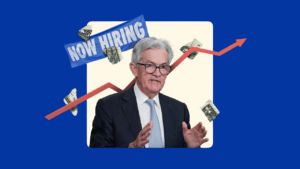Survey: 41% of Americans say inflation is their top economic issue for the 2024 election

The U.S. presidential election is approaching fast, and this year, many Americans will be focused on high inflation’s impact on their wallets. Just over 2 in 5 (41 percent) say inflation is their top economic issue this presidential election, according to Bankrate’s new Politics and Economy Survey.
Even though the inflation rate has plummeted from a 2022 high, prices are still more expensive today than they were before the pandemic, continuing to impact consumers’ finances on everything from their ability to save for emergencies to their contributing enough money toward retirement. Another hit to Americans’ overall cost of living, interest rates are also still the highest in over a decade, even with a recent interest rate cut from the Fed. For now, Americans feel pessimistic about the economy as a whole. Bankrate polling found that more than half (55 percent) of Americans think the economy is on the wrong track.
Read on for more about Americans’ attitudes about the economy today — and which candidate they think will be best for their personal finances.
Bankrate’s key insights on the economy and upcoming presidential election
41% of Americans say inflation is their top economic issue for the 2024 presidential election. This is split along party lines: 56% of Republicans and 28% of Democrats place inflation as their biggest concern.
55% of Americans think the U.S. economy is headed on the wrong track. 32% think it’s headed in the right direction, and 13% don’t know.
42% of Americans think former President Donald Trump’s election would be the best for their personal financial situation. In comparison, 38% of people say Vice President Kamala Harris would be best, and 12% say neither is best.

Bankrate data center
Every week, Bankrate publishes proprietary surveys, studies and rate data, providing the latest data-driven insights on the state of Americans’ personal finances — including credit card debt, homeownership, insurance, retirement and beyond.
See moreRegardless of demographics, Americans agree inflation is their top economic issue this election season
Americans are considering many different economic issues in their vote this year, from inflation and the federal deficit, to health care costs and housing affordability. In all, 41 percent of Americans say inflation is their No. 1 economic issue that comes to mind this presidential election:
Source: Bankrate survey, Sept. 11-16, 2024
Note: Respondents selected their top three choices. The percentages reflect the proportion that selected the issue as their No.1 concern.
More Republicans than Democrats say inflation is their biggest economic issue this presidential election (56 percent versus 28 percent, respectively).
While Americans of all generations agree that inflation is their No. 1 economic issue, they’re more split on which issues are of most importance to them after inflation:
- Gen Zers (ages 18-27): 14 percent cite jobs, health care costs and affordable housing.
- Millennials (ages 28-43): 12 percent cite jobs, health care costs and affordable housing
- Gen Xers (ages 44-59): 16 percent cite health care costs
- Baby boomers (ages 60-78): 14 percent cite health care costs
Vast majority of Republicans think the economy is on the wrong track
Regardless of who wins the presidential election this year, they’ll have to reckon with Americans being largely unhappy with the current economy. Just over half (55 percent) of Americans think the U.S. economy is headed on the wrong track. Others are more optimistic: 32 percent say the U.S. economy is headed in the right direction, and 13 percent don’t know:
Source: Bankrate survey, Sept. 11-16, 2024
Notably, three times as many Republicans say the U.S. economy is on the wrong track, compared to Democrats (83 percent versus 27 percent, respectively). Older generations, especially Gen Xers, also more commonly say the economy is on the wrong track:
- Gen Zers: 43 percent
- Millennials: 51 percent
- Gen Xers: 62 percent
- Baby boomers: 59 percent
On the other side of the political aisle, nearly five times as many Democrats as Republicans say the U.S. economy is going in the right direction (58 percent versus 12 percent, respectively). Along gender lines, 37 percent of men think the economy is headed in the right direction, compared to 28 percent of women.
While Gen Xers are likeliest to say the economy is on the wrong track, younger generations are slightly more common in thinking the economy is headed in the right direction:
- Gen Zers: 34 percent
- Millennials: 34 percent
- Gen Xers: 30 percent
- Baby boomers: 32 percent
High inflation and rampant housing unaffordability can make it feel like the economy is headed in the wrong direction, but Bankrate Senior Economic Analyst Mark Hamrick points out the nation has seen several economic wins recently.
“We’ve seen new highs for the stock market’s major averages, falling inflation, the Federal Reserve shifting into easing mode and a job market close to the level associated with full employment,” he says.
Despite those improvements, Americans may still be feeling pessimistic about the economy due to ongoing inflation outpacing wages — in short, people feel like money doesn’t go as far as it used to. Prices rose 20 percent between the beginning of the post-pandemic inflation surge in 2021 and the second quarter of 2024, while wages only rose 17.4 percent over the same period, according to Bankrate’s Wage to Inflation Index.
Americans mostly favor Trump for their personal finances
More than 2 in 5 (42 percent) Americans say Trump would be best for their personal financial situation and inflation (respectively). A similar percentage (45 percent) say he would be best for the economy.
On the other hand, 38 percent of people say Harris would be best for their personal financial situation; 40 percent say she would be best for the economy and 39 percent say she would be best for inflation.
Source: Bankrate survey, Sept. 11-16, 2024
“Since her shotgun start as a Presidential nominee, Vice President Harris has had to work quickly to introduce herself to the American public in a more substantial way, while seeking to differentiate herself from President Joe Biden to a degree and from former President Trump to a larger degree,” Hamrick says. “That is a work still in progress.”
Harris does fare better in Bankrate’s latest poll than Biden did just a few months ago. In June, before Biden dropped out of the 2024 race, Bankrate asked who the best candidate for Americans’ personal finances would be. At that time, 32 percent of Americans said Biden was the best candidate for their personal financial situation, and 37 percent said Trump.
Learn more about Harris and Trump’s policies
Today, people’s ideal candidate correlates with their overall thoughts on the economy. The vast majority of Americans who think Trump would be best for their personal finances say they think the economy is on the wrong track (84 percent). Only 10 percent of people who think Trump would be best say the economy is going in the right direction.
Meanwhile, 63 percent of people who think Harris would be best for their personal finances think the economy is going in the right direction. Another 23 percent say the economy is on the wrong track.
Hamrick, however, is skeptical either candidate would make a major impact on the economy on their own.
“Both candidates have told voters that they will work to bring prices down, although details are thin concerning how that would work,” Hamrick says. “If it were an easy thing for a president to do, wouldn’t President Biden have done that already? Fighting inflation is the domain of the Federal Reserve.”
Bottom line
Whether it’s an election year or not, if you’re worried about where the economy is headed, there are small things you can do now to give yourself peace of mind.
“Elections and politicians come and go, but the need to save (both for emergencies and retirement), pay down debt and invest all stand the tests of time,” Hamrick says. “When it comes to personal finance, one really must focus on the things that we can control.”
If you don’t have one already, Hamrick highly advises setting up a high-yield savings account to earn more interest on your savings, which will help you build a hefty emergency savings fund more quickly. Additionally, he notes that shopping around for the best rates on everything from a savings account to your car insurance will help you stay within budget and will give you more control over your money.
Why we ask for feedback Your feedback helps us improve our content and services. It takes less than a minute to complete.
Your responses are anonymous and will only be used for improving our website.






